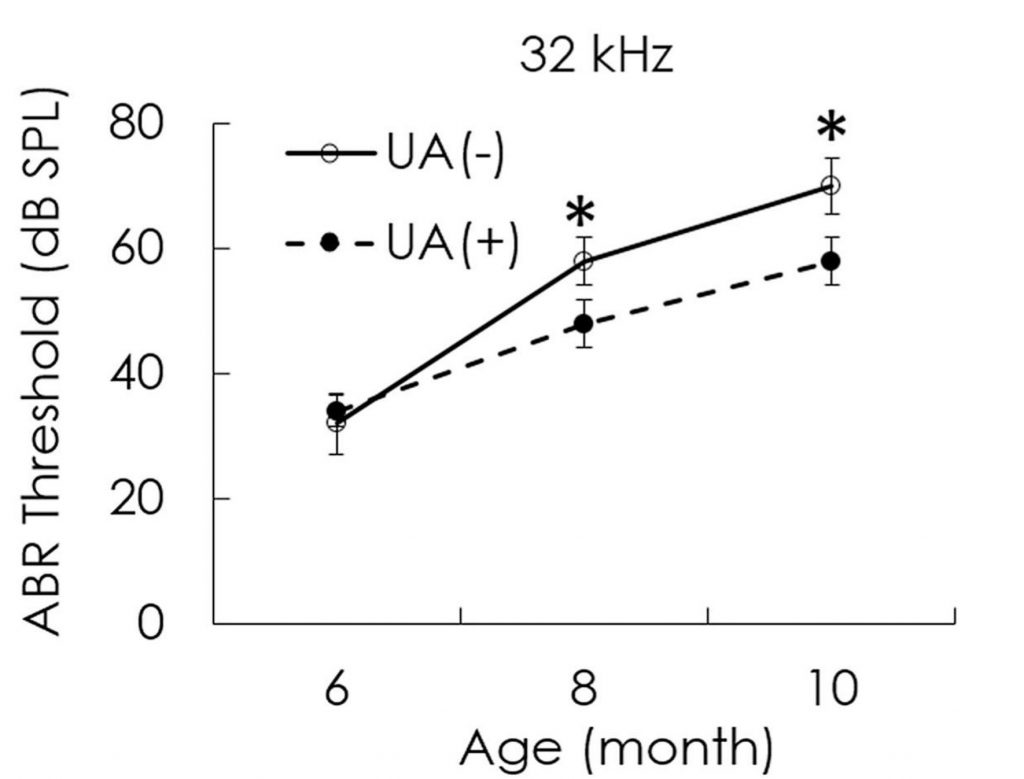Key Points:
- Urolithin A prevents age-related hearing loss, as measured by electrical activity in the brain.
- Supplementation with urolithin A prevents mitochondrial dysfunction in the brain and the organ that senses hearing.
With age our sensory organs degenerate, leading to neurodegeneration. Sensory loss and neurodegeneration are intricately linked to age-related declines in mitophagy — the process our cells use to degrade and recycle dysfunctional mitochondria. Hindered mitophagy is linked to sensory loss and neurodegeneration through its contribution to mitochondrial dysfunction, which is both a driver and consequence of aging.
Urolithin A is a compound produced by our gut bacteria after eating foods like strawberries, pomegranates, and walnuts. High doses of urolithin A (i.e., the amount found in supplements) have been shown to enhance mitophagy and improve mitochondrial health. For this reason, scientists in Korea tested the effect of urolithin A on hearing loss in mice. They found that urolithin A reduced markers of age-related hearing loss, likely through activation of mitophagy.
Urolithin A Prevents Hearing Loss by Stimulating Mitophagy
To test hearing loss, the researchers measured the auditory brainstem response (ABR) of mice, which records the electrical signals produced by the brainstem in response to sound. More specifically, the researchers measured the ABR threshold, which is the lowest volume of sound that can be perceived by the mice and stimulates the brainstem’s electrical activity.
The ABR threshold was measured from mice as they aged (i.e., at 6-, 8-, and 10-months-old). The ABR threshold was also measured at different frequencies (i.e., 8, 16, and 32 kHz). It was found that urolithin A supplementation reduced the ABR threshold at all frequencies when the mice were both 8- and 10-months-old, roughly equivalent to 35- and 40-years-old in humans, respectively. Nevertheless, urolithin A did not reduce the ABR threshold when the mice were 6-months-old, roughly equivalent to 30-years-old in humans.

These findings might suggest that urolithin A supplementation can potentially prevent hearing loss in humans who are over the age of 35. However, humans usually do not begin experiencing hearing loss until around the age of 65. This may be why the ABR threshold reduction for the urolithin A-treated mice was statistically significant but biologically small. In older mice, this reduction may be larger and have more clinical significance.
Furthermore, urolithin A increased genes and proteins associated with mitophagy in the cochlea — the sensory organ that plays a major role in hearing. Additionally, the structures that breakdown mitochondria called mitophagosomes were more abundant in the urolithin A treated mice. This increase in indicators of mitophagy was also observed in the auditory cortex — the part of the brain that processes hearing.
Together, these results suggest that urolithin A mitigates age-related hearing loss by activating mitophagy and improving mitochondrial health. Indeed, the researchers also demonstrated that urolithin A improves mitochondrial function in the cochlea and auditory cortex by showing that it increases cellular energy (ATP) in these regions. In general, healthier mitochondria are more efficient at producing cellular energy.
Urolithin A May Potentially Prevent Hearing Loss, Researchers Say
Previous animal studies have shown that the induction of mitophagy protects the nervous system and deters memory loss in models of Alzheimer’s disease. In humans, urolithin A improves muscle strength by reducing inflammation and promoting mitophagy. The authors said,
“Our results demonstrated that urolithin A may serve as a promising agent for preventing age-related hearing loss.”
However, they do point out several limitations, including that they only measured electrical activity in the brainstem without measuring other regions along the auditory pathway. More studies will be needed to determine the effect of urolithin A on the cochlea, they said. They also mention that more studies are needed to figure out if the effects of urolithin A against hearing loss can be sustained over time.
“UA induces mitophagy and prevents age-related hearing loss in a mouse model. It can be used as a potential preventive agent by activating mitophagy against age-related hearing loss,” the authors conclude.